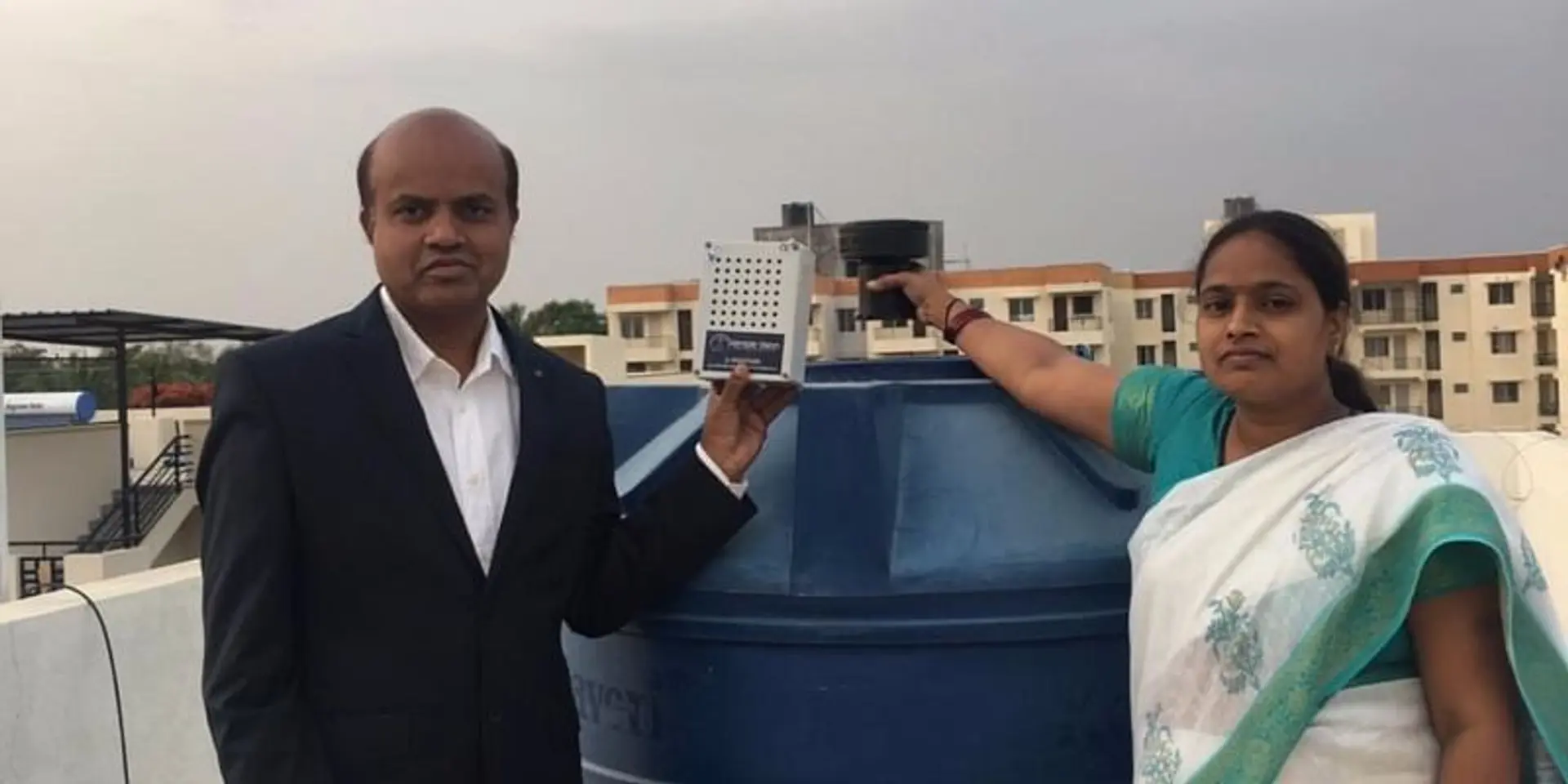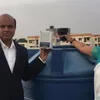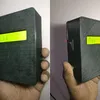Pivot and Persist: This startup has come up with a contactless IoT thermometer to fight COVID-19
Bengaluru-based Nimble Vision builds IoT products for water measurement and conservation. It has now built a mobile-based contactless thermometer to track COVID cases.
The coronavirus pandemic has made people cautious about every little thing. Right from using face masks to hand sanitisers at regular intervals, people are taking utmost care to stay safe.
However, the pandemic has also inspired many entrepreneurs to come up with innovative solutions or tweak their existing products in the face of adversity.

Chinnaya and Vaishali, Founders of Nimble Vision
Husband-wife duo Chinnayya Math and Vaishali Chinnayya, Co-founders of Bengaluru-based , have been working to conserve natural resources, and believe its optimal usage is the only way for sustainability.
Founded in 2019, the startup has been building IoT-based products for water measurement and conservation. According to the founders, the solution has already been deployed in apartment complexes, SEZs, office parks, hospitals, etc., across Bengaluru.
During the pandemic, the startup pivoted itself and has built a contactless mobile-based thermometer called Ni-Varak to tackle the increasing number of COVID cases in the country.
It has an IoT unit connected to the mobile phone with wireless temperature sense. The mobile phone collects the temperature reading directly from the IoT unit. The phone also takes the photo of the person and stores the user data locally and updates the remote server, and the server data is synced to the app and Web dashboards.

The IoT device and App
Tackling the COVID problem
Chinnayya says, they have been carefully observing the spread of the coronavirus from the early days in China, and how it has affected the entire world.
The team also studied the symptoms and remedies of the pandemic. One of the common symptoms that is easy to detect is high fever. Many countries are using thermal screening to identify and isolate people with high temperatures for further screening to confirm corona infection.
“In India too, we saw the spread of the virus, but we do not have the infrastructure and technology to screen the massive population. The wide geography and rural areas bring in additional challenges. The conventional way of using thermal guns and noting down the personal details on paper is time consuming, and the collected data does not reach the authorities in time, which delays the analysis and decision making,” adds Chinnayya.
The team felt India needed a solution that was cost-effective, easy to deploy in both rural and urban areas. Chinnayya adds that they see most state governments are struggling to collect data in contact tracing. It is mostly done by thermal guns, and this, he says, is not very effective.
How does Ni-Varak help?
According to Chinnayya, “Ni-Varak can help the government in quickly doing the survey because it recognises the Aadhaar card of people and collects their temperature along with geo location and time stamp. This data is instantly made available to all the concerned authorities. Ni-Varak builds one nation and one database, which is the need of the hour.”
Speaking about how they are different, Chinnayya explains, the thermal guns just scans the temperature and does not associate user details. Ni-Varak does both - taking temperature, associating user details, and geo location and date time. This helps in building the travel history of each scanned users across India. It also acts as an alternative to biometric attendance system. Ni-Varak collects login and logout details, and based on this, the AI calculates the attendance for all employees.
The product provides quick access on both app and web. It is a match-box size IoT unit which is powered by a battery, and can be carried anywhere as it works on mobile internet.
Chinnayya says it is a cost-effective solution with massive features. It builds with the national database, maintains the continuous history of the all the people, and works on mobile data. Ni-Varak data can also be integrated with the Aarogya Setu app.

The IoT unit
Business and funding
For its water conservation product, Nimble Vision currently works on a B2B and B2C model. For the B2B model, it charges Rs 30,000 per unit. The startup has deployed a total of 1,000 units at SEZs, IT parks, hospitals, and pharmaceutical companies. For B2C, it charges Rs 12,000, and has deployed another 1,000 units in apartment complexes and at homes.
Nimble Vision has also won the Elevate Karnataka 2018 Startup award.
Differentiator and pricing
There are several startups working to combat the spread of the pandemic. Ahmedabad-based Limelight has come up with a wearable wristband to keep a check on the body temperature of employees. The wristband can also detect cough and sneeze count of employees. There is also Belgaum-based Sensegiz, which works on a similar model.
Hyderabad-based has developed an IoT-based contactless, wireless thermal scanning device called Neem, which accurately measures an individual’s body temperature and can be integrated into a company’s security software.
Ni-Varak has a CE Certification, and trials have been done with family, friends, and a few organisations. The product comes in two parts - IoT unit and mobile app, which costs Rs 7,000. The mobile app can be installed on any smartphone.
The IoT unit and smartphone, with pre-installed mobile app, costs Rs 20,000, and is suitable for industries. “We are also planning to integrate Alexa to this solution,” says Chinnayya.
YourStory’s Pivot and Persist series spotlights Indian startups that are pivoting to seize new business opportunities, transforming their business models, and offerings to navigate the current COVID-19 crisis.
Edited by Megha Reddy






